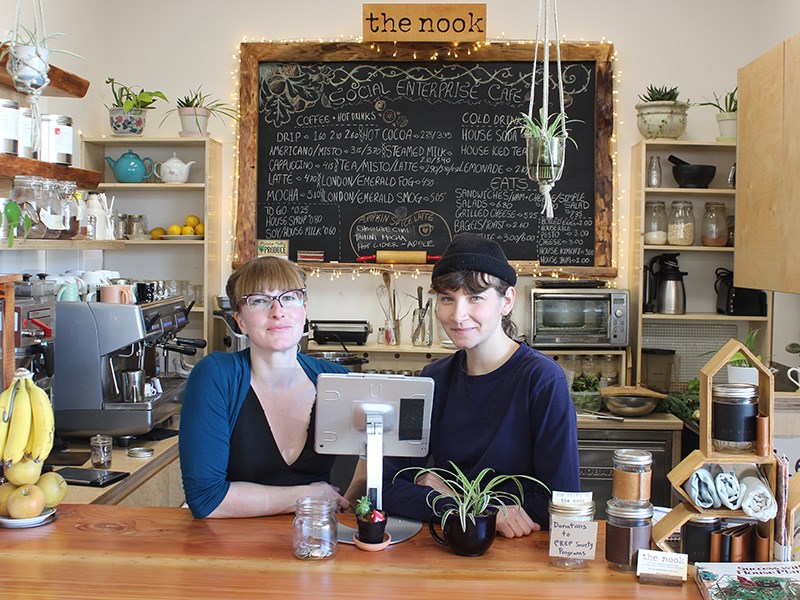Return on investment and profitability are still key indicators of business success, but having a positive social impact and building a legacy are gauges increasingly being considered.
The rise of social enterprise may seem recent, but the ideas and practice behind them are not new, according to PREP Society’s manager at The Nook, Adriana Virtue.
The Nook coffee shop inside Powell River Public Library is run by the non-profit PREP Society in partnership with the library, and the business is set up to generate revenue for the society’s programs.
“The programs we run are very dependent on government funding and social funding,” said Virtue. “Starting a social enterprise for a non-profit is a great idea because you can blend the profit you make into your society.”
Currently the coffee shop trains six volunteers, including two from inclusion Powell River.
“Other volunteers are more work experience based, so they’ve never had a job before or they’re in high school and need community service hours for Brooks [Secondary School],” added Virtue.
When it can afford to, the goal is to hire people they have trained.
“We’re about to break even,” she said. “It’s so close. We’re working toward that everyday.”
K-Lumet, an environmentally friendly firestarter is another local social enterprise. The concept was developed in Switzerland to employ those with barriers to finding work. In 2013, Barbara Kisschowsky purchased the licensed franchise for Powell River and Texada Island, allowing for partnership opportunities throughout BC.
“Inclusion Powell River came on in the last year with a joint venture agreement,” said project manager Leni Goggins. Kisschowsky’s original intent was to employ her son Zachary, who is impacted by an intellectual disability.
“We’ve received funding through Powell River Community Forest and from Vancity and First Credit Unions,” said Goggins.
Receiving the grant from Vancity was a big deal as it is outside their catchment.
“But K-Lumet can have a franchise model so they wanted to support us with the intention of franchising into Vancouver eventually,” added Goggins.
Currently the product is made in Germany by people with intellectual disabilities and packaged at a facility on Texada Island. However, a manufacturing facility is being set up at Townsite Market that aims to be running by the spring and will hire those with barriers to employment as well as intellectual disabilities. There are currently five employees but an additional 17 will be hired part time at the production facility.
“We have the licence,” said Goggins. “It has a huge potential for employing a lot more people than just in Powell River.”
On the lower Sunshine Coast, Persephone Brewing Company is a familiar sight to anyone heading for the ferry at Langdale. The 11-acre farm and microbrewery is also a social enterprise.
“One of our main partners and part owner of the Persephone Brewing Company business is the Sunshine Coast Association for Community Living (SCACL),” said general manager Dion Whyte. “They are a registered not-for-profit society and their mission is to provide programs and services to help adults with developmental disabilities have full citizenship and lead meaningful, rich lives.”
SCACL formed a wholly-owned subsidiary company and is a five per cent shareholder in the company as a whole. The brewery also provides employment opportunities to SCACL clients and partners with them on smaller social enterprises they run independently on the farm.
Persephone also acts as a business incubator for local startups in the region and sponsors an agriculture program for children.
“It’s essentially a granting program we fund out of our revenues,” said Whyte.
In terms of profitability, Whyte said expectations are different for this type of business model.
“It’s a longer game than you might otherwise plan for as a startup brewery,” he said. “Four or five years in here we’re not necessarily reaping large profits but we’re in good shape.”
Whyte also believes the impact-based work the brewery does is something that differentiates it in the market from a competitive standpoint.
“Also, it’s just the type of business that we are interested in being,” said Whyte. “I don’t know that we would want to do this work if we couldn’t incorporate that aspect of it.”
Currently, social enterprise is not defined within Canada’s Income Tax Act, nor is there any type of certification, however, in BC a legal structure has been in place since 2013. A Community Contribution Company caps a company’s profit at 40 per cent with the remainder going toward social causes. Yet this structure does not necessarily work for every venture that wants to do good.
Another option: Persephone became a B-certified corporation in 2015.
“B certification is for private business essentially what fair trade might be for coffee or certified organic might be for farming,” said Whyte.
It is administered by an independent, objective organization that sets a series of criteria and metrics for assessing how progressive businesses are in respect to how they treat the planet, their people and the impact they have in their community socially and culturally.
“We feel it’s important to have some means of holding ourselves accountable,” added Whyte, “to the values that we espouse and say that we are doing.”



